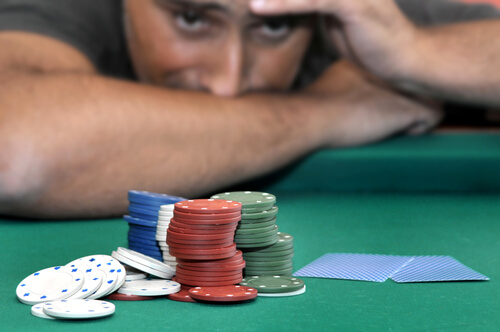For many people, gambling is a fun activity that offers plenty of excitement along with the chance to win some money. There are certain individuals, however, who veer over this line – from enthusiastic punter to problem gambler. The line that separates the two is surprisingly thin, but when crossed can turn gambling into a negative experience.
As an industry, gambling has come under increasing scrutiny in recent years in relation to problem betting within it. Online casinos in particular have come under fire in this regard, but this could be interpreted as an unfair allegation. In truth, problem gambling can affect the punter who physically goes into his local bookmaker as much as someone playing online.
A brief introduction
As with all things in life, moderation is the key to enjoying an activity without it causing you any harm. In this regard, gambling is no different to enjoying a night out with friends down the local pub or eating a takeaway. If you remember to enjoy your gambling experience in moderation, you will find it remains fun and positive.
But what if you start to lose control and step across the line of fun and moderation? This is where the issue of problem gambling comes in.
Simply put, problem gambling is when your life is being negatively affected by your gambling. The American Psychiatric Association classes this kind of compulsive gambling as an impulse-control behaviour which compels sufferers to gamble more and more. Some also argue that it is an addiction disorder like alcoholism, as problem gamblers become dependent on the act of gambling and the feelings it creates.
What to look out for
To be able to effectively deal with the issue of problem gambling in yourself or a friend, you first need to know what to look out for. What is particularly dangerous about this problem is that it often starts out with small, almost unnoticeable changes in behaviour that steadily grow. By the time the problem has become apparent to all, it can be quite daunting to tackle.
Here are a few signs to watch out for:
- Changes in behaviour
Problem gamblers often begin to exhibit alterations in their usual patterns of behaviour. This could be increased secrecy, a short temper when questioned, moodiness and irritability. If you notice these signs in yourself or a friend, then it may be a sign that gambling has become an issue.
- Increased gambling levels
This is another very common sign of a problem gambler. As they begin to get more addicted to gambling, they will often put more bets on than usual or spend more time online playing games. This is not only to try to win back money they may have lost but also to get the buzz that gambling gives them.
- Financial trouble
A major danger for any problem gambler is losing money. One of the consequences of gambling too much is that bank accounts can soon be wiped out and savings spent with bills left unpaid. If someone you know who likes to bet is struggling with their finances for no other obvious reason, then it might be time to do something about it.
- Social isolation
A by-product of spending more time at the online casino is that problem gamblers will become isolated socially. They will simply not have the time to spend with family or friends anymore as all their time will be spent placing bets or playing slots. This is another classic sign of problem gambling and something to be careful of.
- Work problems
If someone is in the grip of a gambling addiction then they may well underperform at work or are frequently absent. Some will even spend their time at work gambling, although they will usually do this secretly. If someone who is normally a reliable, hard worker suddenly deviates from this pattern, it may be symptomatic of a gambling problem.
What can you do about a problem gambler?
If you think you have spotted someone who may have an issue with gambling or you have even diagnosed problem gambling in yourself, there are some things you can do to help. Being able to nip this in the bud as soon as possible is key to being able to beat it.
The first thing to do will be the hardest. Whoever has the issue with problem gambling should stop playing immediately. Carrying on gambling will only make the addiction worse and make it harder to break in the long term. Drastic yet effective action here would be to remove any money deposited with online casino sites or bookmakers while closing any accounts held with them.
The next step is to seek professional help. This should be done if you or the person who has the issue with gambling feels they cannot beat it alone. Luckily, as we have outlined below, there are various resources designed to assist you.
The best places to get help
One of the best places to get help is via the independent charity Gamble Aware. Their website BeGambleAware.org is full of useful information on problem gambling and what you can do to overcome it. They offer various types of support to people, including a superb live chat feature.
The online casino and bookmaker sites used by the individual affected should also be able to provide help in overcoming this issue. Many include features that enable gamblers to set limits. This means that you can take control of play and prevent excessive gambling. Self-exclusion programs are a superb example of this and allow you to limit the amount you can wager on one bet or game. All reputable sites will also have links to professional help under their Responsible Gambling section.
If you are based in the UK, GamCare.org.uk is another fine resource that can help. The people there offer impartial advice to individuals affected by problem gambling in an effort to help them overcome it. If you feel it is needed, you can even organise a one-to-one meeting with a GamCare professional counsellor, although online and telephone help is also available.
Taking action is key
For many people who think their gambling is getting out of hand, the process of asking for help or admitting they have a problem is a difficult one. This is always the best thing to do, however.
Only after the problem is recognised and understood can it be beaten. If you or anyone you know is showing any of the signs we have outlined above, then getting professional help is a wise move in making problem gambling a distant memory.









